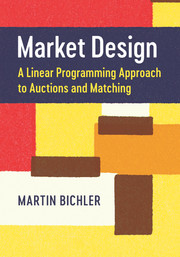Book contents
- Frontmatter
- Dedication
- Contents
- 1 Introduction
- Part I Microeconomic Fundamentals
- Part II Multi-Object Auction Design
- 5 An Overview of Multi-Object Auctions
- 6 The Simultaneous Multi-Round Auction Format
- 7 Sealed-Bid Multi-Object Auctions
- 8 Open Multi-Object Auctions
- 9 The Combinatorial Clock Auction Formats
- Part III Approximation and Matching Markets
- Part IV Appendices: Mathematical Optimization
- References
- Index
8 - Open Multi-Object Auctions
from Part II - Multi-Object Auction Design
Published online by Cambridge University Press: 08 December 2017
- Frontmatter
- Dedication
- Contents
- 1 Introduction
- Part I Microeconomic Fundamentals
- Part II Multi-Object Auction Design
- 5 An Overview of Multi-Object Auctions
- 6 The Simultaneous Multi-Round Auction Format
- 7 Sealed-Bid Multi-Object Auctions
- 8 Open Multi-Object Auctions
- 9 The Combinatorial Clock Auction Formats
- Part III Approximation and Matching Markets
- Part IV Appendices: Mathematical Optimization
- References
- Index
Summary
The revelation principle (see theorem 3.3.1) suggests that if a social-choice function can be implemented by an arbitrary indirect mechanism (e.g., an open auction) then the same function can be implemented by a truthful direct revelation mechanism. Analyzing direct mechanisms is often more convenient, and the revelation principle allows one to argue that this restriction is without loss of generality. Yet there are cases where one prefers to implement and model the indirect version of a mechanism rather than its direct counterpart.
One argument used in the literature refers to interdependent valuations. The linkage principle implies that open auctions generally lead to higher expected revenue than sealed-bid auctions, with interdependent bidder valuations. Milgrom and Weber (1982) wrote: “One explanation of this inequality is that when bidders are uncertain about their valuations, they can acquire useful information by scrutinizing the bidding behavior of their competitors during the course of an (ascending) auction. That extra information weakens the winner's curse and leads to more aggressive bidding in the (ascending) auction, which accounts for the higher expected price.”
Another argument for open auctions is that the winners of an ascending auction do not need to reveal their true valuation to the auctioneer, only that it is above the secondhighest bid. With respect to multi-object auctions, Levin and Skrzypacz (2017) write that economists think of open auctions as having an advantage because bidders can discover gradually how their demands fit together. Most spectrum auctions are open auctions, largely for these reasons.
As a result, much recent research has focused on ascending multi-object auctions, i.e., generalizations of the single-object English auction where bidders can outbid each other iteratively. The models can be considered as algorithms, and we will try to understand the game-theoretical properties of these algorithms. In particular, we want to understand if there is a generalization of the English auction to ascending combinatorial auctions that also has a dominant strategy or ex post equilibrium. Unfortunately, the answer is negative for general valuations. However, there are positive results for restricted preferences.
A strong restriction of preferences is found in assignment markets, where bidders bid on multiple items but want to win at most one. This restriction allows us to formulate the allocation problem as an assignment problem, and there exists an ascending auction where truthful bidding is an ex post equilibrium.
- Type
- Chapter
- Information
- Market DesignA Linear Programming Approach to Auctions and Matching, pp. 126 - 166Publisher: Cambridge University PressPrint publication year: 2017



